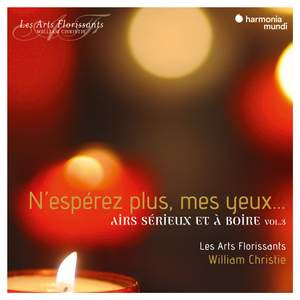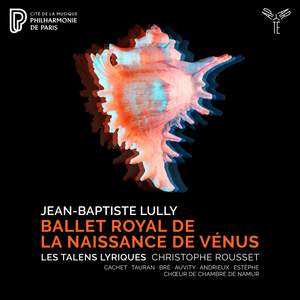Program: #21-33 Air Date: Aug 09, 2021
To listen to this show, you must first LOG IN. If you have already logged in, but you are still seeing this message, please SUBSCRIBE or UPGRADE your subscriber level today.
Les Arts Florissants are back with Volume 3 of their “Airs sérieux et à boire” series; a remarkable tribute to the music inspired by the poetry by the Comtesse de la Suze; and a world-premiere recording of a ballet by Lully.
I. N’espérez pus, mes yeux: Airs sérieux et à boire, Vol. 3 (Les Arts Florissants/William Christie). Harmonia Mundi CD HAF 8905318.

If one had to name one single repertoire that Les Arts Florissants had brought to light, it would be the French air de cour. The very first recordings made by the ensemble already testify to William Christie’s love for this genre and to their vibrancy and brilliance.
Since 2015, a group of the most highly respected singers and instrumentalists on the current Baroque scene has undertaken to revisit this repertoire. The concerts of the first two series and the discs entitled “Bien que l’Amour” and “Si vous vouliez un jour” (edited by Harmonia mundi) have been acclaimed across Europe and America. The adventure continues in 2020-2021 with a third volume conceived in the same vein, associating once again courtly arias and drinking songs by Étienne Moulinié and Pierre Guédron.
"This is the year that William Christie’s group Les Arts Florissants turns 40. Yet how can there be even a twinge of middle age about an ensemble that cheerfully imitate cows, sheep and birds, sing about sex and perform at one point squatting on the floor?" (The Times)
"William Christie and his ensemble masterfully recreate the musical atmosphere of the seventeenth century French court. (...) An extraordinary musical evening." (La Nueva España)
- Allons, allons gay gayment / Claude Le Jeune
- Dialogue de la nuit et du soleil / Étienne Moulinié
- Symphonie
- O che gioia ne sento mio bene / Étienne Moulinié
- Bien qu'un cruel martyr / Pierre Guédron
- N'espérez plus mes yeux / Antoine Boesset
- O doux sommeil / Étienne Moulinié
- Dans le lit de la mort / Étienne Moulinié
- Fantaisies sur une jeune fillette / Eustache Du Caurroy
- Belle qui m'avez blessé / Pierre Guédron
- Rendez-la moy cruelle / Claude Le Jeune
- Suite instrumentale
- Rossignol mon mignon / Claude Le Jeune
- Quel espoir de guérir / Pierre Guédron
- Prélude & allemande chromatique
- Aux plaisirs aux délices bergères / Pierre Guédron
- Souffrez, beaux yeux pleins de charme / Étienne Moulinié
- Allemande & gigue
- Lorsque j'étais petite garce / Pierre Guédron
- Que dit-on au village / Pierre Guédron
- Libertas & sarabande
- Cessez mortels de soupirer / Pierre Guédron
- Suzanne un jour / Claude Le Jeune
II. Ballet Royal de la Naissance de Vénus (Les Talens Lyriques/Christophe Rousset). Aparte CD AP255.

French court ballet is a curious form. First developed in the mid-16th century, the works combined poetry, sung and acted music and dance, along with visual arts, sophisticated sets and costumes. Plots were intended as the glue which held these disparate elements together, but also were designed to showcase the glories of the court or the particular monarch's reign. There was a participatory element, many of the dancers were aristocrats at court of great technical ability, whilst there would also be larger-scale ensemble moments.
It was during the 13-hour (!) Ballet Royal de la Nuit, with music by music by Jean de Cambefort, Jean-Baptiste Boësset, Michel Lambert and others, that premiered in 1653 in Paris that the 14-year-old King Louis XIV (whose dancing of the role of Apollo cemented his epithet as the Sun King) came to regard a young Italian musician and dancer, Jean-Baptiste Lully. Within a month, Lully had been made royal composer for instrumental music.
The vocal and choral music is interweaved with the dance, so that each group of dances is preceded by short vocal moments. This would be developed further by Lully in his operas, so that each act of the opera would often end in a grand danced and sung moment which was linked to the plot.
On this disc we hear the Ballet royal de la Naissance de Venus from 1665, which was one of the more important ballets from the 1660s and was a compliment to the king's sister-in-law, Madame (wife of his brother), Henriette, the youngest daughter of King Charles I of England (who was married to King Louis XIV's aunt). It was moderately successful, receiving nine performances. Madame (age 21) appeared in the first scene, being birthed as Venus whilst her husband, Philippe, Duc d'Orleans (age 25) was the Morning Star in the second scene, and the king (age 27) finally appeared as Alexander the Great in the final scene (with Madame as Roxana). In all there were 106 different roles performed by 96 individuals, 20 musicians and 14 singers! From the libretto we know the names of the musicians, how many there were and what instruments some of them played.
I can think of no better way of getting introduced to Lully's ballet music than via this compact yet imaginative work in this wonderfully engaging, stylish and characterful performance. Granted, it is tricky to imagine the sheer spectacle of the original, but there is plenty of interest and contrast in the music.
As the ballet does not fill a full disc, we are also treated to a short sequence of music from Lully's other ballets, from the Ballet royal des Amour deguisés (from 1664), Psyché (his most developed comédie-ballet with Molière from 1671), Le Carnaval (from 1675) and Le Bourgeois gentilhomme (again with Molière from 1670).
Michel de Marolles said 1656 that the ballets featured 'that which is enjoyable, rare and marvellous' - precisely.
Choeur de Chambre de Namur
Christophe Rousset
III. Je m’abandonne à vous Harmonia Mundi CD HMM 902674.75.
Angélique Mauillon, harp
Myriam Rignol, viola da gamba
- Sébastien Le Camus - Je m'abandonne à vous, amoureux souvenir
- Sébastien Le Camus - Ah ! fuyons ce dangereux séjour
- Anonymous - Sans amour et sans tendresse
- Sébastien Le Camus - Délices des Étés, frais et sombres Bocages
- Sébastien Le Camus - Bois écartés, demeures sombres
- François Campion - J'ai juré mille fois de ne jamais aimer
- François Dufault - Suite en La Min: I. Allemande
- François Dufault - Suite en La Min: II. Courante
- François Dufault - Suite en La Min: III. Sarabande
- François Dufault - Suite en La Min: IV. Gigue
- Sébastien Le Camus - Laissez durer la nuit, impatiente Aurore
- Le Sieur de Machy - Pieces de Violle: Prélude
- Anonymous - Vous ne m'attirez point par vos attraits charmants
- Sébastien Le Camus - Vous ne m'attirez point par vos attraits charmants
- Sébastien Le Camus - Ah ! qui peut tranquillement attendre
- Bertrand de Bacilly - Qu'il est propre à se faire aimer
- Michel Lambert - J'ai juré mille fois de ne jamais aimer
- Marin Marais - Pièces à une et à deux violes, Premier livre: Prélude en Sol
- Sébastien Le Camus - Il n'est rien dans la vie
- Sébastien Le Camus - Doux printemps
- Henry Du Mont - Laisse-moi soupirer, importune raison
- Michel Lambert - Laisse-moi soupirer, importune raison
- Monsieur Royer - Étoiles d'une nuit plus belle que le jour
- Sébastien Le Camus - Je sens au coeur un nouveau trouble
- François Campion - Qu'il est propre à se faire aimer
- Bertrand de Bacilly - Je fuyais sous ces verts ombrages
- Michel Lambert - J'aime, je suis aimé
- Monsieur de Sainte-Colombe - Chaconne en ré
- Bertrand de Bacilly - J'ai voulu suivre une autre Loi
- Sébastien Le Camus - Un Berger plus beau que le jour
- Sébastien Le Camus - Forêts solitaires et sombres
- Honoré d'Ambruis - Le doux silence de nos Bois
- Bertrand de Bacilly - Dans ce bocage, où brille une jeune verdure
- Honoré d'Ambruis, Robert Cambert - Sous ces ombrages verts, un Amant le plus tendre
- Bertrand de Bacilly - Savourons à longs traits cet excellent Muscat
- Le Sieur de Machy - Pieces de Violle: Gavotte
- Bertrand de Bacilly - Étoiles d'une nuit plus belle que le jour
- Jean-Benjamin de La Borde - Laissez durer la nuit, impatiente Aurore
- Jean-Baptiste Weckerlin - Sans amour et sans tendresse (Conseil d'aimer)
Composer Info
Claude Le Jeune, Étienne Moulinié, Pierre Guédron, Antoine Boesset, Eustache Du Caurroy, Jean-Baptiste Lully (1632-1687), Sébastien Le Camus, François Campion, François Dufault, Le Sieur de Machy, Bertrand de Bacilly, Michel Lambert, Marin Marais, Henry Du Mont, Monsieur Royer, Monsieur de Sainte-Colombe, Honoré d'Ambruis, Jean-Benjamin de La Borde, Jean-Baptiste Weckerlin
CD Info
Harmonia Mundi CD HAF 8905318, Aparte CD AP255, Harmonia Mundi CD HMM 902674.75